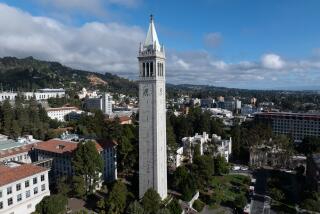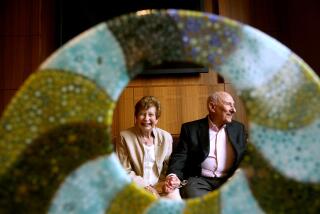Program to Encourage Research on Religion’s Impact on U.S. History
- Share via
Two Yale historians, echoing an increasingly common complaint, say religion has been woefully ignored in the writing of U.S. history. But the historians hope to end that with a new Yale-based program that will encourage young scholars to explore religion’s impact on U.S. society.
Jon Butler, a professor of American history at Yale, and Harry Stout, professor of American Christianity, will have $1.5 million from the Pew Charitable Trusts to accomplish the task. They plan to use the funds to underwrite fellowships and grants for the study of religion in American culture.
In a recent interview, Butler accused historians of removing a major element in the American drama, giving a stilted view of the nation’s history.
Butler, who will direct the program with the assistance of Stout, said, “We hope it will have an impact on how scholarship in American history emerges in the 20th Century.” The idea, he said, is to influence young scholars early, at the most critical stage in their careers, in hopes of encouraging a lifelong pursuit of assessing religion’s role in U.S. history.
“Religion’s role in American life, past and present, has been considerable, yet most American history textbooks are silent about religion, especially after the age of the Puritans,” Butler said in an announcement of the Yale-Pew program.
“Without some concerted attention to the relationship between religion and American historical development, we will continue to misunderstand major facets of where we have been, who we are and what we are becoming as a people,” he said.
Ultimately, Butler said, he hopes the program will “make religion as common to the discussion of American history as politics and economics.”
Historians are not bent on denigrating religion--it’s just that it probably “makes them uncomfortable,” he said.
“Historians like to deal with concrete facts, but religion brings an ambiguous element to scholarship that tends to make historians a bit, well, embarrassed. It seems to stress the personal and ‘otherworldly,’ as opposed to the intellectual and rational,” he said.
The Yale-Pew program is geared toward scholarly research at the university level, but Butler said he believes the fruits of that research are likely to trickle down to the elementary and secondary school levels also--a point of view shared by some educators who have been at the forefront of efforts in recent years to bring the study of religion into the public schools.
Traditionally, public school systems and the textbooks they use have steered clear of religion--at the expense of good history, critics say--for fear of being accused of violating separation of church and state as spelled out in the Constitution.
But advocates of bringing instruction about religion into the schools have scored major victories in recent years, most notably in California, where the State Board of Education in 1987 told major publishers it wanted to buy textbooks that included more information about religion.
The publishers listened, and in 1990 California approved a history series for kindergarten through eighth grades published by Boston-based Houghton Mifflin that took note of many formerly neglected religious aspects of U.S. history.
The Yale-Pew program is nondenominational and non-theological in scope, with a broad-tent view that will include not only institutionalized religions such as Christianity and Judaism but also Islam and American Indian religions, as well as sects that operate on the fringes of the religious landscape.
Fellowships and research grants to graduate students and faculty members will range from $2,500 to $25,000. Although the program is open to scholars around the country, some of the fellowships will be awarded exclusively to Yale graduate students.
Butler expects most awards to go to scholars who are writing either dissertations or their first books.
About 30 grants will be awarded yearly for the three-year period of the grant. But Butler said there is reason to believe the program will be extended.
More to Read
Sign up for Essential California
The most important California stories and recommendations in your inbox every morning.
You may occasionally receive promotional content from the Los Angeles Times.













